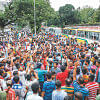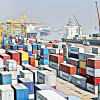Blockade dents income of ride-hailing drivers, rickshaw pullers

Mohammad Alauddin, who drives a CNG-run three-wheeler on hire for a living, had waited to no avail for passengers at Pallabi of Dhaka yesterday during the usual peak hours from 10:00am to 12:27pm.
"I have been waiting for about two and a half hours in the same place, but I can't find any passengers," a dejected Alauddin told The Daily Star during a nationwide blockade called by several political parties.
On a normal day, he would have earned Tk 600 to Tk 700 by this time, he informed.
A section of people is not setting foot outside their homes apprehending arson attacks during the blockade, which has led to this current situation, he said.
The intermittent blockade, beginning on October 31, has given rise to uncertainties for transport workers, including motorcyclists, offering transportation for hire, CNG-run three-wheeler drivers and rickshaw pullers, in Dhaka.
These individuals, who rely on a steady stream of passengers for their daily income, are now struggling to make ends meet as the blockade has caused a sharp decline in their earnings.
"The blockade has brought my life to a standstill. The lack of passengers has severely impacted my livelihood," said Alauddin.
"I'm struggling to pay my daily deposit to the three-wheeler owner and provide for my family. With each passing day, my anxiety is growing and I'm unsure how long I can bear this situation."
During the blockade, over 150 vehicles were set alight, creating panic among common people.
Yesterday, a lower number of vehicles were found on the roads than on a usual day when the reporters went round Mirpur 12, Mirpur 10, Shewrapara, Agargaon, Farmgate, Bangla Motor, Shahbagh, Kalabagan and New Market areas from 10:00am to 2:00pm.
Motorcyclists offering the ride-hailing service say their demand increases when there is heavy traffic congestion. But the number of passenger vehicles falls sharply when a blockade is observed.
Drivers of CNG-run three-wheelers said demand for their services had already dipped as the metro rail was carrying a lot of the office-bound passengers on the Uttara-Motijheel route.
The blockade had turned the situation even worse, they said.
Didar Hossain, a motorcyclist offering transportation for hire, said he was approached by only two persons between 9:00am and 11:00am at the Bangla Motor intersection and he had rejected both their offers.
He said he usually charges over Tk 200 to transport a person from the Bangla Motor intersection to the Mohakhali bus terminal.
"But amidst the blockade, one passenger offered Tk 150, which is very low, so I didn't go."
His earnings on a normal day are anywhere from Tk 1,500 to Tk 2,000 but during the blockade, he got fewer passengers and earned Tk 700 to Tk 800 by toiling from morning to evening.
Since he does not get any passengers after evening during blockades, he decides to call it a day early.
Another rider like him, Rimon Hossain, said he had waited for passengers in Gabtoli from 11:00am to 1:00pm yesterday to no avail.
On a normal day, people start seeking his services within 15 to 20 minutes of him parking anywhere by the side of the road.
"During a blockade, earning Tk 700 to Tk 800 is very hard for me, whereas on a normal day, I earn Tk 1,800 to Tk 2,000," he added.
Khorshed Alam, a rickshaw puller in Mirpur 11, said his daily income had dropped significantly due to low demand.
"I only got eight passengers from 10:00am to 2:00pm, earning Tk 200. On a normal day, I would have earned over Tk 300 by this time."
Alam and his wife live in a rented house in a slum in Mirpur and they can barely afford to pay the rent and feed their family.
"I have to pay Tk 250 as garage rent every day, and it is difficult to run the family with the rest of the money. Normally, I could eat fish twice a day, but now I can eat fish once," he said.
He expressed frustration and anxiety over the situation, saying, "This month will be very difficult because the income has decreased. I don't know how long this will last and how I will survive."


 For all latest news, follow The Daily Star's Google News channel.
For all latest news, follow The Daily Star's Google News channel. 








Comments